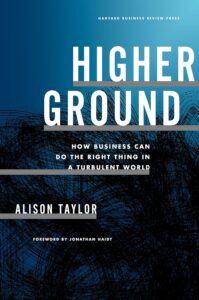Podcast: Play in new window | Download

As a professor in NYU’s prestigious Stern School of Business, Alison Taylor spends a lot of time with the next generation of business leaders. In her new best seller, “Higher Ground: How Business Can Do the Right Thing in a Turbulent World,” she tells us that her MBA students are not hoping to have careers working for ethical companies. They now expect to.
For decades, organizations largely committed themselves to doing whatever was legally allowable to maximize shareholder value – a singular focus that’s proving to be no longer viable.
Taylor’s book easily could have been titled, “How Business Can Do the Right Thing in a Turbulent World,” because while shareholders remain unrelenting in pressuring companies to drive stock prices higher and higher, other stakeholders – customers and employees, especially – have significantly elevated their expectations of companies over issues like diversity and inclusion, fair treatment of workers, impacts on the environment, transparency and social responsibility.
 Taylor’s book (the focus of this episode) shows leaders how businesses can navigate this messy paradigm shift, build trust, and achieve long-term strategic advantage in our turbulent world. And she argues, the starting point is for companies to gain new and greater clarity around their purpose saying, “a healthy organizational culture has never been a better source of strategic advantage.”
Taylor’s book (the focus of this episode) shows leaders how businesses can navigate this messy paradigm shift, build trust, and achieve long-term strategic advantage in our turbulent world. And she argues, the starting point is for companies to gain new and greater clarity around their purpose saying, “a healthy organizational culture has never been a better source of strategic advantage.”
Because society itself is so divided, however, Taylor says companies can no longer hope to be all things to all people. The only realistic approach today is to define who they are – and who they aren’t – and then attract the stakeholders who want to align themselves accordingly.
In this rather timely conversation, we discuss why respect for employees is now the most important principle in organizational leadership, why transparency is a managerial essential – and why so many workplace managers are stressed out about the contradictory pressures on driving performance and supporting employee well-being.




